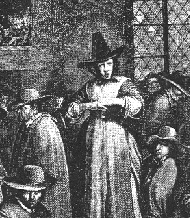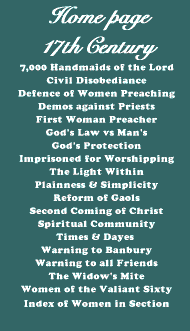 |
|
 |
|
Quaker Women
![]()
Mary Boreman, being taken from a meeting in London, was asked by the alderman what her name was. "You may, instead of my name," she replied, "write thus, 'Afflict not the widow and the fatherless', and then when you look over the roll you may see your duty."
Mary Tompkins, ordered by a Boston magistrate to remove her hat, threw it on the ground, clapped her foot on it, and said, "See I have your honor under my feet."
Elizabeth Peacock walked into a London church, admonished the congregation to have contrite spirits, and was sentenced to hard labor for two months. She then returned to the same church, preached against hypocritical worship, and was jailed for four weeks. She then reappeared in another church, where she told the congregation that the kingdom of God was within them, and was removed from the building and relaesed near her house. The following day she walked out of a Quaker meeting and into the chapel at Whitehall, where she announced that it was impossible to please God without faith; she was put in jail for six more weeks.
After Deborah Harding was arrested for attempting to preach in a church in Gloucestershire, the magistrate offered to release her if she paid a fine (she refused); then if she promised to be good (she refused); then if she promised to leave by a back door (she still refused); he reluctantly sent her to jail.
[Circa 1653 at age 32] Mary Fisher traveled south with another Friend, Elizabeth Williams, twenty years her senior. In Cambridge the two stood at the Sidney-Sussex college gate and admonished the students, becoming the first Quakers in England to be stripped to the waist and whipped, "and all the while they were in their punishment," writes Besse,"they sang and rejoiced, saying, The Lord be blessed, the Lord be praised, who hath thus honored us...to suffer for his name's sake."
Women transformed themselves into visual signs of the corruption of church and state. Elizabeth Adams left her farm in Kent and traveled to London, where she stood in front of the houses of Parliament for two days with a vessel on her head; she then overturned it, "as many things were turned, and aturning," sat down on it, and finally smashed it. The following year she bought two torches, lit them, and rode silently through the streets of Canterbury on horseback. When questioned by the magistrate she announced, "Friend, I see. . .an honest man that truly fears the living God, and will stand up to vindicate the Truth." When he threatened her with hanging, she replied laconically that, "He was not the man she looked for."